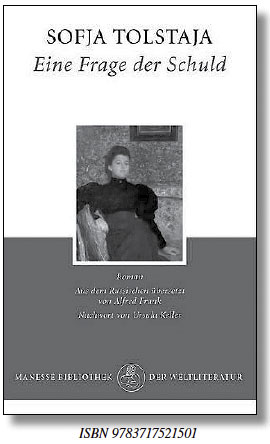Rediscovered – Sofja Tolstaja: A question of guilt
Rediscovered – Sofja Tolstaja: A question of guilt
dk. In addition to the great work of Leo Tolstoy, whose great novels “War and Peace” (1869) and “Anna Karenina” (1878) occupy a prominent place in world literature, the writings of his wife Sofja Tolstaja, published long after her death, deserve as well to be appreciated.
Sofja Tolstaja grew up in a bourgeois family of physicians, her father maintained a flourishing practice in Moscow. Her parents attached great importance to the education and formation of their daughters. They allowed Sofja to acquire the training as a private tutor at the University of Moscow. This was then the best possible training for girls. Sofja was also artistically talented and after her training she wrote the story “Natascha”. In 1862, at the age of eighteen, she married the much older count and eminent writer Leo Tolstoy. After her marriage, she entirely devoted herself to the promotion of the literary work of her husband and the education and training of her children. Leo Tolstoy and she spent happy years at the estate of Yasnaya Polyana, where they also set up a school for peasant children. Sofja took an active part in the emergence of “War and Peace”, discussing the novel with her husband and making always copies of his manuscripts before they went to print. In those days, she writes about this collaboration: “It seems to me that his novel ‘War and Peace’ will become outstanding. Everything he read to me moved me to tears.”¹ During the next years he wrote “Anna Karenina” and many stories and legends. After 19 happy years in the country, the couple decided to move to Moscow in 1881 in order to provide the oldest children with a good education. Both, however, were not happy in the city and were delighted when they were able to return to Jasnaja Poljana. Leo Tolstoy, gradually underwent an inner change, he longed for a simpler and more spiritual life. He turned to religious questions, rejected the life of the upper class, which he felt to be meaningless, and strove to live a life of poverty and active charity, largely because he is shocked at the poverty of the workers in the cities and the peasants in the countryside. His wife could not quite understand this development, she experienced it as rejection of her family. A feeling of spiritual alienation arose between the spouses, although they still loved each other. Sofja continued to take part in Tolstoy’s works, such as in the “Book alphabet” written for school, and the “Four booklets”², which contained narratives of history, physics, biology, and religion in order to teach children moral and social values.

The “Kreutzer Sonata” did not appeal to Sofja because of the female image expressed in it. She began to write again and wrote the novel “A Question of Guilt” from the perspective of a woman. Other stories such as “Lied ohne Worte” (Song without words) or stories for children such as “Das Skelettpüppchen” (The skeleton puppet) were written. Sofja wrote also articles for a number of newspapers, such as a widely noticed appeal for donations for the hungry people of the year 1891. At that time, both of them organised aid for the peasants affected by crop failures.The spiritual alienation between the spouses remained until Leo Tolstoy’s end of life in 1910. One reason for this may be that Sofja refused to allow her husband to transfer the property rights in his work to the Russian people and to pass the estate to the peasants. After his death, his wife too agreed with this arrangement, and his daughter Alexandra later fulfilled his wish to transfer the estate to the peasants. With their outstanding literary works and their beneficial work for the Russian population both personalities will remain unforgettable for posterity. In the novel “A Question of Debt”, the life of a young woman in 19th century Russia is portrayed. Sofja Tolstaja deals with the question of what constitutes a happy relationship between man and woman and what makes it fail. Anna, the heroine of the novel, enters into marriage with the much older Prince Prosorski, who marries Anna, because he is primarily interested in physical love for her. Only after the marriage Anna learns that he is known as a women’s hero in the area. Anna, however, is in search of pure love, which emerges through the spiritual consensus of the spouses. The question what real love is, pervades the whole novel. In the course of their marriage, Anna suffers from the selfish attitude of her husband, who pervades her with his jealousy. She feels attracted to Bechmetew, a friend of her husband who takes part in her inner spiritual life and turns to her children with joy. This leads to violent jealousy attacks of her husband, who begins to hate her, because he cannot possess her completely. Although Anna is loyal to him and cares about him again and again, the marriage ends tragically. Beyond this marriage drama, the reader learns a lot about the life in the country in Russia of the 19th century, which makes the novel a fascinating read. •
1 Tolstaja, Sofia. Eine Frage der Schuld (A question of guilt). Munich, 6th edition 2010.
p. 231
2 Ibid. p. 257